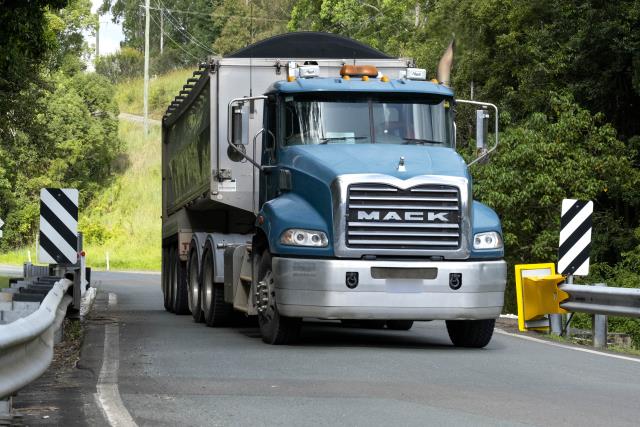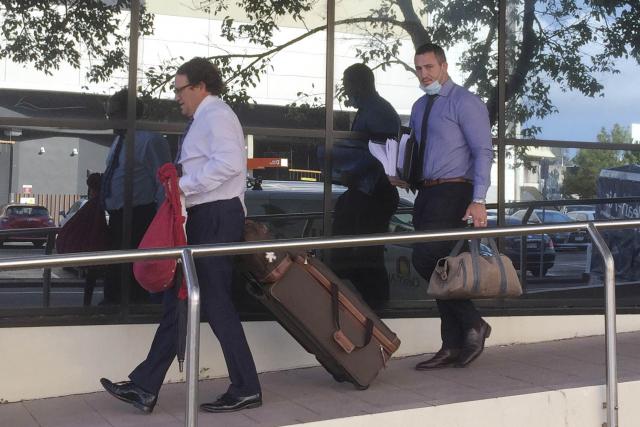Kin Kin Quarry’s senior site executive Harry Stewart, transport manager Scott Palmer and quarry adviser, Groundwork Plus, director Clayton Hill were among witnesses at Maroochydore Planning and Environment Court on Monday in the ongoing case of Noosa Council v Kin Kin Quarry.
Also taking the witness stand in the case’s fourth day of hearing were regular Kin Kin Quarry users Yandina procurement manager Simon Lake, construction and transport business owner Malcolm Cann and Liam Kelleher of Sunshine Coast Civil.
Three weeks after beginning, the case continued in front of presiding Judge Gary Long and again with a public gallery filled with hinterland residents.
The matter relates to Council’s allegations set out by their barrister Mitchell Baty and associate Susan Hedge, that the application was filed by council for the relief for the community from haulage trucks, in five areas.
The five areas relate to allegations of the quarry’s non-compliance of its Quarry Management Plan (QMP) in failing to avoid truck convoying, covering of loads, operating hours and use of quarry trucks during school bus hours, and the allegation the impact of the quarry’s intensification of work constitutes a material change of use.
Counsel for Cordwell Resources, barrister Errol Morzone QC and associate David Purcell, earlier informed the court their client strongly objected to the allegations.
Mr Morzone said four allegations – travelling during school bus times, operating outside hours, travelling in convoy and with uncovered loads – were alleging breaches of a management plan – the QMP, that did not constitute an offence. He said any intensification of use of the quarry had been without authority required, and what Council sought was a consideration that the quarry’s development approval had been contravened.
Cordwell Resources senior site manager Harry Stewart said all drivers received an initial induction to the quarry where road rules including tarping loads, no convoying and 40km/hr speed limits were outlined.
Mr Stewart answered questions from Mr Baty, saying, in his understanding, the extraction limit of the quarry was one million tonnes per annum and the current level of extraction could be increased if there was a market for it.
He said measures in place to restrict trucks during school bus times and stop convoying included a boom gate that opened to allow a truck to exit every five minutes, 15 seconds and holding trucks at the boom gate between 6.30-6.45am, but he was unsure of the school bus operating hours.
“I believe we do everything compliance-wise with the QMP,“ he said.
He said up to 66 per cent of material extracted was for Cordwells concrete. He wasn’t certain what percentage of Cordwell trucks left the quarry during school bus time, but thought it would be about 20 per cent of the total, and was unaware of any investigations into stockpiling of material at Cordwell storage sites at Yandina and Chevallum to divert truck access from Kin Kin during school bus hours.
Mr Stewart confirmed Cordwell Resources was using the same road transport protocol set up by previous operator Nielsens which included a record of complaints.
When Mr Baty asked for the complaint documents they could not be supplied. Mr Morzone said they were irrelevant to the case. Mr Stewart said Mr Cordwell dealt with complaints.
Mr Baty asked Mr Stewart how he achieved a “low frequency, regular transport program“ as cited in the quarry’s driver code of conduct. He said a low frequency was attained by the restriction of only being able to load 12 trucks an hour (one every three minutes).
Cordwell’s transport manager Scott Palmer told the court he was responsible for day to day monitoring of trucks and fleet safety. He said he tried to reduce truck movements during school bus times by trying to dissuade customers from deliveries at that time.
If you’re a regular contractor and you need something, you get it anytime, Mr Baty put to Mr Stewart.
“I use my discretion. Some will tell you it’s critically important. We’re a commercial business,“ Mr Palmer said.
“We can’t always supply everything they need. We ask non-contractors to come outside school bus hours. The TMP (Transport Management Plan) doesn’t say we can’t deliver during school bus hours. Our customers will seek material elsewhere if we can’t supply.“
Mr Palmer said he had not read affidavits from Council, residents, Cordwell or traffic data but had been given a “broad overview of the situation“.
When Mr Baty told him Council had recorded 111 convoying incidences, Mr Palmer said he struggled to come up with a reason for it, but the only logical conclusion was that one truck pulled up after exiting the boom gate.
“We do all we can to ensure compliance,“ he said.
When Mr Baty informed him of 498 recorded examples of uncovered loads, Mr Palmer said in his opinion these were covered, but have been mistakenly recorded as uncovered.
Quarry adviser, Groundwork Plus director Clayton Hill told the court Cordwell Resources had installed a GPlus online platform that managed drivers’ training requirements and kept them up to date.
He said when truck drivers scanned into the quarry with a QR code, their training competencies were visible on a screen and training modules available. He said the computer system also acted as a prompt to drivers to tarp their loads on exit. If the driver ticks no tarp a notification is sent to the senior site manager but the tool could not identify an inaccurate recording, he said.
As part of his cross examination, Mr Baty asked quarry users about their timing of quarry material access at Kin Kin, the use of stockpile sites and truck driver measures to avoid the school bus.
Procurement manager Simon Lake told the court in his work on building subdivisions and roads, he required truckloads of aggregate material lined up at the start of the day, then as needed throughout the day.
“As long as the price is right, it doesn’t matter where it comes from,“ he said.
Wolvi construction and transport business operator Malcolm Cann described the quarry operation as market-driven with trucks up and down the range all day. The closest quarry, suitable product, makes sense, he said.
Mr Cann said about eight or nine months ago, his drivers were told the school bus driver was in two-way radio contact and to make contact with him to avoid meeting the bus on “the range“, a narrow, winding, speed section of Pomona Kin Kin Road.
The court was scheduled to resume on Thursday afternoon to hear from the remaining witness, Martin Cordwell.
Counsel for the parties will then exchange written closing submissions ahead of the final day of the trial on 19 April where each side will present their closing submissions to Judge Long.









